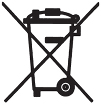Information on disposal and recycling

Each EU member state has issued their own national regulations to implement the EU WEEE Directive, as well as the EU Directive on batteries and accumulators. These national regulations contain, among other things, special information requirements
Germany
Electrical and Electronic Equipment Law (ElectroG) - information for private households
The electrical and electronics equipment law - short ElektroG - includes many new issues regarding the handling of electrical and electronic devices. We would like to illustrate the key information here.
1. Separate collection of old equipment
Obsolete electrical and electronics equipment is called: electrical and electronics waste (WEEE). Owners of obsolete electrical and electronics equipment are obliged to dispose of it separately from unsorted municipal waste, using dedicated collection systems.
2. Batteries and accumulators
Usually, owners of obsolete electrical and electronics equipment are obliged to separate old batteries and accumulators from the equipment before returning it, if these should not be fully incorporated into the equipment. This is not mandatory if the obsolete equipment is returned at a collection point of a public waste disposal carrier, and handled separately from other obsolete equipment for recycling purposes.
3. Return of obsolete electrical and electronics equipment
Owners of obsolete electrical and electronics equipment can return the devices at collection points of the public waste disposal carriers, as well as manufacturers and distributors as defined by the ElektroG. Attached you can find a list of collection points: www.ear-system.de/ear-verzeichnis/sammel-und-ruecknahmestellen.jsf
4. Privacy notice
Obsolete electrical and electronics equipment often contain sensitive private information. This applies in particular to computers and mobile phones. It is the responsibility of every end user to completely delete all data stored in the obsolete equipment, before return and disposal.
5. Meaning of the symbol "crossed out waste bin"
The symbol of a crossed out waste bin tags electrical and electronics equipment that is to be collected separately from unsorted municipal waste at the end of service life.

6. Additional information
BIKE24 is a member of the return system "take-e-back". For more information, please visit www.take-e-back.de.
Batteries Act (BattG)
Batteries and accumulators must not be disposed of with household waste. Customers are obliged to return used batteries and accumulators. A free return is possible at collection points of the public waste disposal carriers, at the manufacturers and points of sale.
Labelling
The symbol of a crossed out waste bin tags products which are to be collected separately from unsorted municipal waste at the end of service life. Close to this symbol you will find the chemical name of the harmful substance contained in the battery or accumulator. "Cd" stands for Cadmium, "Hg" for Mercury and "Pb" for Lead.
Return
You can return used batteries and accumulators at collection points of the public waste disposal carriers, to the manufacturers, distributors and to BIKE24. If you want to return used batteries and accumulators to BIKE24, please contact our service in advance. We will be happy to support you.
Ireland
BIKE24 is registered as a producer in Ireland.
The producer registration number of Bike24 GmbH is IE03050WB.
BIKE24 will take back your WEEE on a one-for-one, like-for-like basis, free of charge. WEEE and waste batteries can also be returned to your local civic amenity site free of charge. The following link will show you how to find the civic amenity site closest to you where you can recycle your WEEE, batteries and light bulbs,
https://www.weeeireland.ie/household-recycling/where-can-i-recycle/
Never put WEEE, batteries or light bulbs in any of your bins.